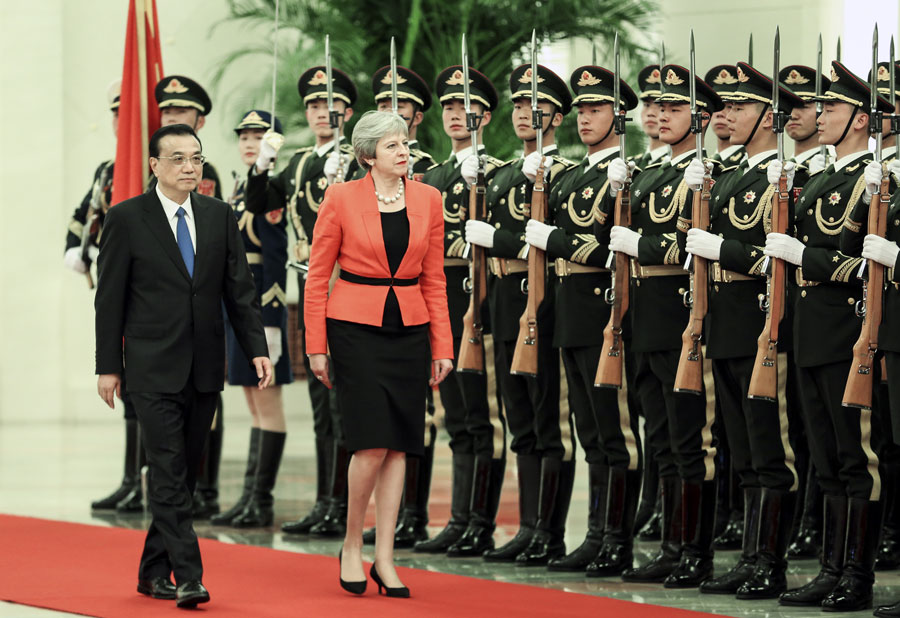Theresa May looks to the future on China visit


British Prime Minister Theresa May is in China this week for a three-day visit to Wuhan, Beijing, and Shanghai.
The embattled leader is making her second visit to the country since taking office in 2016 and is set to meet President Xi Jinping, while talking up Britain as a destination for Chinese investment.
May's predecessor, David Cameron had overseen a warming of relations, with both sides hailing a "golden era" in UK-China ties.
Cameron's government went out of its way to promote trade between the two countries, and the UK became the first major western country to join China's Asian Infrastructure Investment Bank in May 2015.
In recent years, UK-China trade has been growing fast, with China now Britain’s second-largest trading partner outside the European Union. Indeed, Chinese direct investment into the UK totaled $20.8 billion in 2017 – almost double that of 2016. Chinese students are well represented at UK universities, and growing numbers of British people are learning Mandarin and taking the opportunity to visit China.
Relations appeared to reach new heights with the state visit of Xi Jinping to the UK in 2015.
However, since the political fallout resulting from Brexit and Cameron's resignation, Britain is under new management – with a prime minister that has expressed misgivings about some aspects of globalization, particularly immigration.
But the country will soon have an urgent need to forge new trading relationships following its exit from the EU in 2019; and the chance to lay the groundwork for a comprehensive trade deal with the world’s second-largest economy –– something the EU has yet to achieve –– is an opportunity May cannot afford to miss.
Britain's post-Brexit future depends on the country being able to strike out on its own and build new independent trade links with major economic powers around the world. With the groundwork laid by May's predecessor, the prime minister has the chance to take advantage of the positive mood during her trip to China –– possibly even generating some optimistic headlines.
Yet it is far from certain May herself has a clear vision of the UK's future, and she remains mired in all manner of problems back home with her Conservative party divided over Brexit. Indeed, the prime minister may herself be shortly out of a job.
Developing Britain's relationship with China won’t be easy. Her noted coolness on China's trade initiatives and her handling of the Hinckley Point C nuclear power plant –– being built jointly by France’s EDF and China General Nuclear Power Group –– contrast sharply with David Cameron’s relaxed attitude to Chinese investment.
But if May can spend her visit talking about issues the two countries agree on –– rules-based international trade, investment, and joint development and exchanges in education and science –– then she can help continue the "golden era" of relations.
And for Beijing, it is clear that a full, public endorsement of the Belt and Road Initiative by May would go down well, along with a renewed emphasis on cooperation in trade, and closer military ties.
And few would doubt that the two countries have a lot to offer each other.
China, with its burgeoning middle class, can provide desperately-needed new markets for British companies, especially as it moves towards a service-orientated economy. Chinese investment can also help fund vital new infrastructure.
Britain, on the other hand, has world-class education institutions, investment opportunities and companies with intellectual property and technology that China needs for its development. Better access to London’s financial center would also be welcomed.
With a series of education agreements already announced and a new English-language initiative launched by May, the visit appears to have had a good start. And British fears about closer trade links with China meaning an end to frank dialogue are likely misplaced – the two will continue to have disagreements and take steps to protect their core interests.
But with apparent willingness on both sides to improve relations and look to the future, the British government should play its part in seizing the opportunity.
And for Theresa May, safely away from speculation about her future, she must surely wish for more opportunities like these.
James Skinner is a contributing editor at China Daily with an MA in International Relations. He has a particular interest in British and American politics, as well as global security issues.
The opinions expressed here are those of the writer and do not represent the views of China Daily and China Daily website.


































